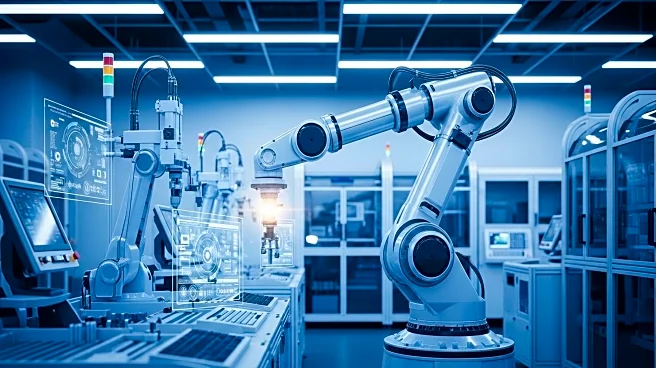What's Happening?
The 2025 World Manufacturing Convention (WMC) has commenced in Hefei, Anhui Province, China, under the theme 'Intelligent Manufacturing For a Better Future.' The convention is a platform for showcasing advancements in manufacturing technology, including internet-connected vehicles (ICV) and new energy vehicles (NEV). Attendees have the opportunity to view various technological displays, such as autonomous buses, aerial vehicles, and innovative robotics. The event highlights the integration of smart technologies in manufacturing processes, aiming to enhance efficiency and sustainability in the industry.
Why It's Important?
The convention underscores the growing importance of intelligent manufacturing in the global economy. As industries worldwide seek to improve efficiency and reduce environmental impact, innovations in smart manufacturing technologies are crucial. The focus on ICV and NEV reflects a shift towards sustainable transportation solutions, which could significantly impact the automotive industry. These advancements may lead to increased investment in smart manufacturing technologies, influencing global supply chains and production methods. The event serves as a catalyst for international collaboration in developing cutting-edge manufacturing solutions.
What's Next?
The convention is expected to foster discussions on the future of manufacturing, with potential collaborations between international companies and Chinese manufacturers. As the industry moves towards more sustainable practices, stakeholders may explore partnerships to leverage these technologies for global markets. The emphasis on intelligent manufacturing could lead to policy changes and increased funding for research and development in this sector. Companies attending the convention may announce new initiatives or products that incorporate these technologies, further driving innovation in the industry.
Beyond the Headlines
The focus on intelligent manufacturing raises ethical considerations regarding automation and its impact on employment. As manufacturing processes become more automated, there may be concerns about job displacement and the need for workforce retraining. Additionally, the integration of smart technologies in manufacturing could lead to data privacy issues, as more information is collected and analyzed to optimize production. These developments may prompt discussions on regulatory frameworks to address these challenges and ensure responsible use of technology.











